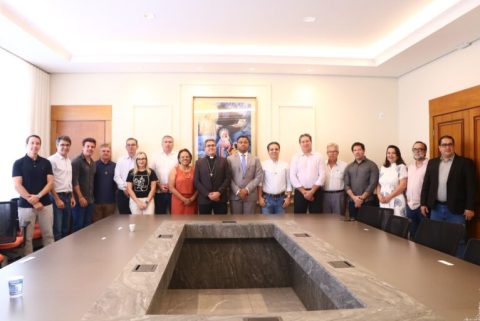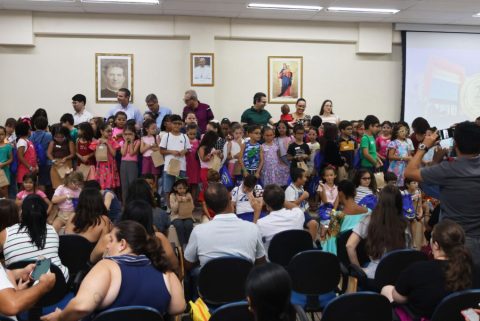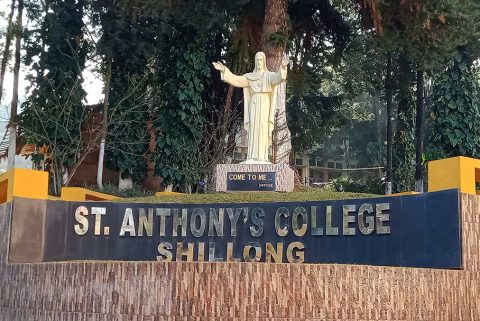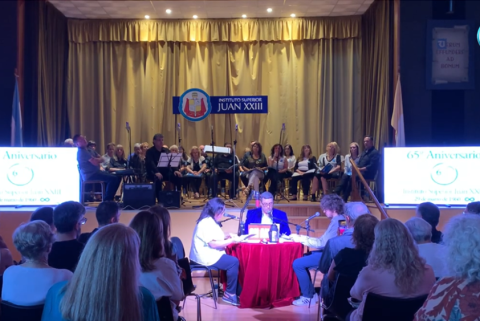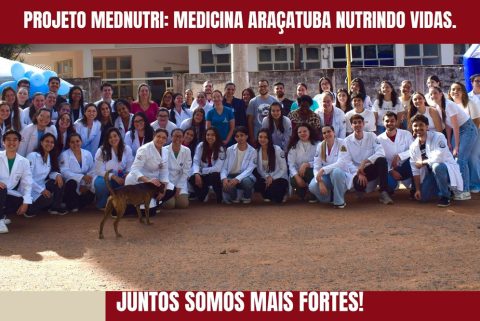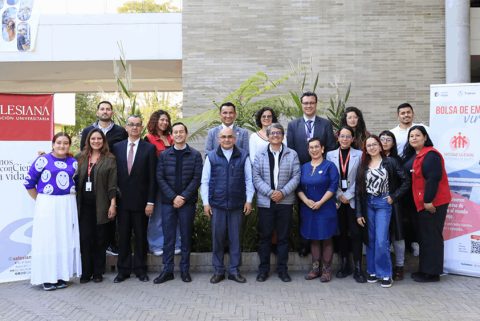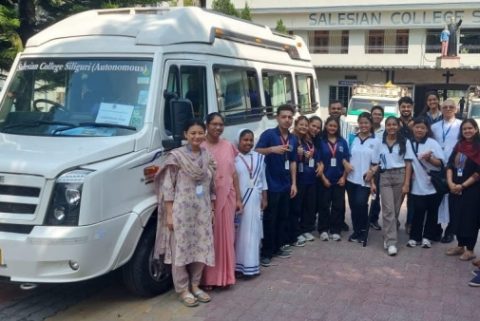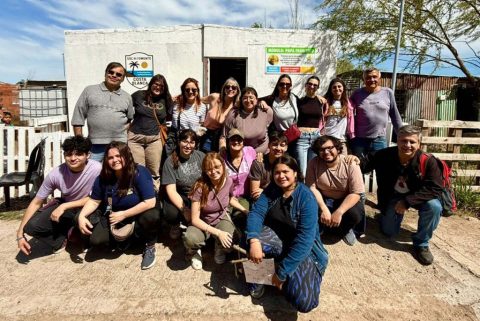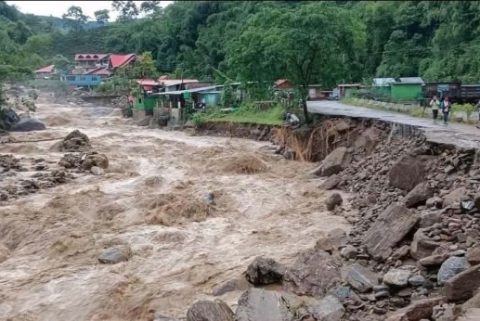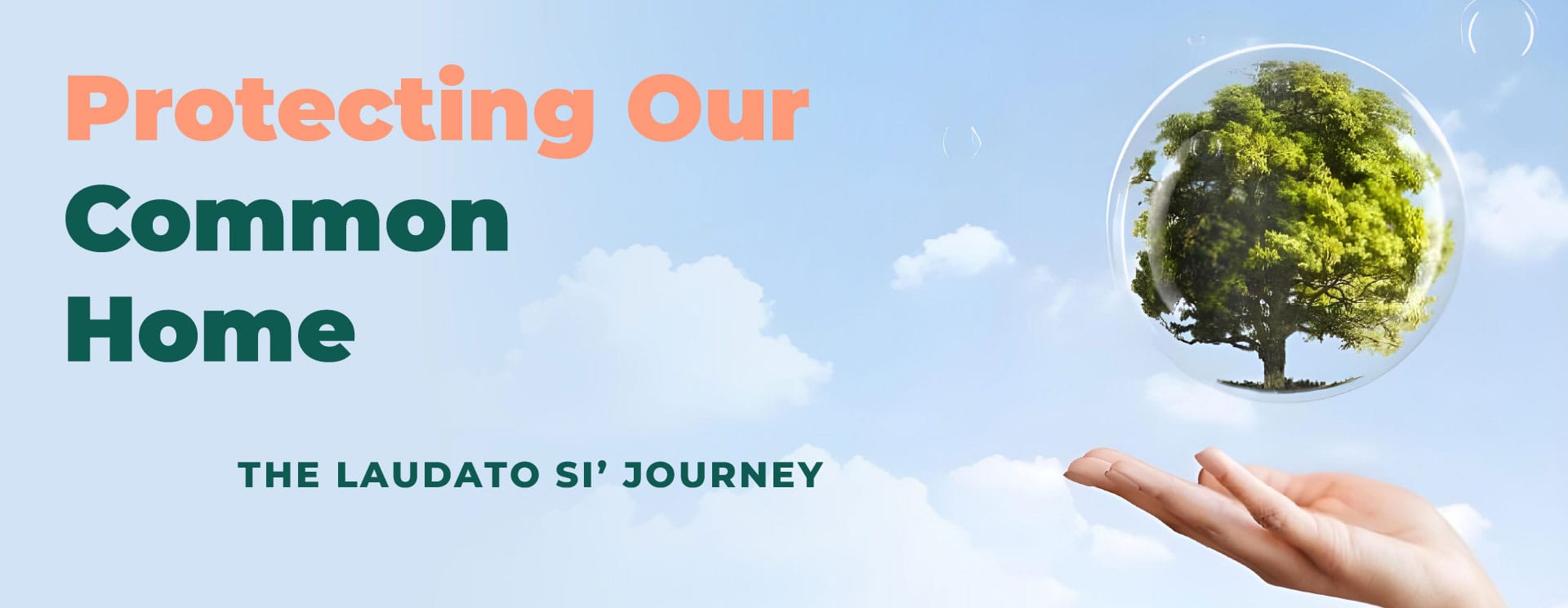
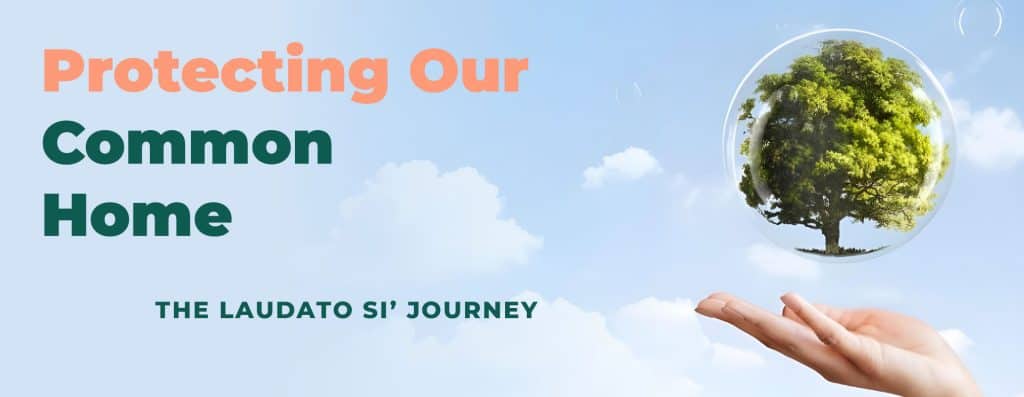
Embracing the Call of Laudato Si’: A Journey Toward Integral Ecology
Rooted in the spirit of Pope Francis’ Laudato Si’, the Laudato Si’ Action Platform invites institutions to take steps toward ecological conversion and total sustainability. Sponsored by the Vatican’s Dicastery for Promoting Integral Human Development, this global initiative equips Catholic communities with the tools and resources needed to care for our common home.
By joining this journey, IUS institutions can also contribute to lead with faith, science, and innovation, to fostering a future rooted in justice, peace, and responsible environmental care.
A mission to care for our common home
A mission to care for our common home
As Salesians, let´s also cultivate respect for the gifts of the Earth and creation, let´s inaugurate a finally eco-sustainable lifestyle and society. It is today that we have the opportunity to prepare a better tomorrow for all of society.
Let’s cultivate respect for the gifts of the Earth and creation, let´s inaugurate a finally eco-sustainable lifestyle and society, we have the opportunity to prepare a better tomorrow for all.
"From the hands of God we have received a garden, we cannot leave a desert to our children"
- Pope Francis
Let's be part of a Global Impact
524
Active Universities & Schools
150
Countries
20 million
People Reached
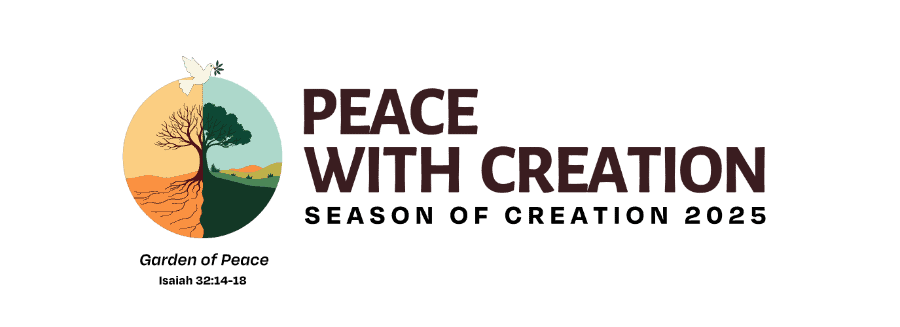
The Season of Creation is a time to renew our relationship with our Creator and all creation through celebration, conversion, and commitment together. This year, we join our sisters and brothers in the ecumenical family in prayer and action for our common home.
The season starts 1 September, the Day of Prayer for Creation, and ends 4 October, the Feast of St. Francis of Assisi, the patron saint of ecology beloved by many Christian denominations. Throughout the month-long celebration, the world’s 2.2 billion Christians come together to care for our common home.
The Season of Creation is a time to renew our relationship with our Creator and all creation through celebration, conversion, and commitment together. This year, we join our sisters and brothers in the ecumenical family in prayer and action for our common home.
The season starts 1 September, the Day of Prayer for Creation, and ends 4 October, the Feast of St. Francis of Assisi, the patron saint of ecology beloved by many Christian denominations. Throughout the month-long celebration, the world’s 2.2 billion Christians come together to care for our common home.
"If we really wish to prepare a path to peace in our world, let us commit ourselves to remedying the remote causes of injustice, settling unjust and unpayable debts, and feeding the hungry.”
"If we really wish to prepare a path to peace in our world, let us commit ourselves to remedying the remote causes of injustice, settling unjust and unpayable debts, and feeding the hungry.”
Let's be part in Embracing the Season of Creation 2025
Explore the activities, celebrations, and initiatives already added to the events map, and see how communities everywhere are sharing their joy and commitment. Click the link and get inspired by the global map of hope and action:
https://padlet.com/comms95/season-of-creation-2025-on0pwe64k1nzgdl9
Discover the Laudato Si’ Goals
Join the mission and explore the seven Laudato Si’ Goals, which provide guidance on urgent and immediate action in caring for our common home. Each goal offers a practical way for institutions to respond to the ecological crisis with hope and purpose.
“We must regain the conviction that we need one another, that we have a shared responsibility for others and the world.”
(Laudato Si’, 229)

Response to the Cry of the Earth
The Response to the Cry of the Earth is a call to protect our common home for the well-being of all living creatures as we equitably address the climate crisis, biodiversity loss, and ecological sustainability. Actions could include the adoption of renewable energies and energy sufficiency measures, achieving carbon neutrality, protecting biodiversity, promoting sustainable agriculture, and guaranteeing access to clean water for all.

Response to the Cry of the Poor
The Response to the Cry of the Poor is a call to promote eco-justice, aware that we are called to defend human life from conception to death and all forms of life on Earth. Actions could include projects encouraging solidarity, with special attention given to vulnerable groups such as Indigenous communities, refugees, migrants, and children at risk; analysis and improvement of social systems; and social service programs.

Ecological Economics
Ecological Economics acknowledges that the economy is a sub-system of human society, which itself is embedded within the biosphere – our common home. Actions could include sustainable production and consumption; ethical investments; divestment from fossil fuels, exploitative animal agriculture, and any activity harmful to the planet and all living creatures; supporting circular economies; prioritizing care labour and protecting the dignity of workers.

Adoption of Sustainable Lifestyles
The Adoption of Sustainable Lifestyles is grounded in the idea of sufficiency and promoting sobriety in the use of resources and energy. Actions could include reducing waste and recycling, adopting sustainable dietary habits (opting for a more plant-based diet and making judicious choices about meat and dairy consumption), becoming conscious of consumerist attitudes and habits, encouraging greater use of public transport and active mobility (walking, cycling), and avoiding single-use items (e.g., plastic).

Ecological Education
Ecological Education is about re-thinking and re-designing curricular and institutional reform in the spirit of integral ecology in order to foster ecological awareness and transformative action. Actions could include ensuring equitable access to education for all, promoting human rights and the well being of the ecosystems, fostering Laudato Si’ themes within the community, encouraging ecological leadership from both students and teachers, and ecological restoration activities.

Ecological Spirituality
Ecological Spirituality springs from a profound ecological conversion and helps us to “discover God in all things”, both in the beauty of creation and in the sighs of the sick and the groans of the afflicted, aware that the life of the spirit is not dissociated from worldly realities. Actions to encourage a more ethical and compassionate relationship with all God’s creation could include promoting creation-based liturgical celebrations,developing ecological catechesis, retreats, formation programmes, etc.

Community Resilience and Empowerment
Community resilience and empowerment envisage a synodal journey of community engagement and participatory action at various levels. Actions could include building awareness, promoting advocacy and developing people’s campaigns, and encouraging rootedness and a sense of belonging in local communities and neighbourhood ecosystems.
Response to the Cry of the Earth
1
The Response to the Cry of the Earth is a call to protect our common home for the well-being of all living creatures as we equitably address the climate crisis, biodiversity loss, and ecological sustainability. Actions could include the adoption of renewable energies and energy sufficiency measures, achieving carbon neutrality, protecting biodiversity, promoting sustainable agriculture, and guaranteeing access to clean water for all.
Response to the Cry of the Poor
2
The Response to the Cry of the Poor is a call to promote eco-justice, aware that we are called to defend human life from conception to death and all forms of life on Earth. Actions could include projects encouraging solidarity, with special attention given to vulnerable groups such as Indigenous communities, refugees, migrants, and children at risk; analysis and improvement of social systems; and social service programs.
Ecological Economics
3
Ecological Economics acknowledges that the economy is a sub-system of human society, which itself is embedded within the biosphere – our common home. Actions could include sustainable production and consumption; ethical investments; divestment from fossil fuels, exploitative animal agriculture, and any activity harmful to the planet and all living creatures; supporting circular economies; prioritizing care labour and protecting the dignity of workers.
Adoption of Sustainable Lifestyles
4
The Adoption of Sustainable Lifestyles is grounded in the idea of sufficiency and promoting sobriety in the use of resources and energy. Actions could include reducing waste and recycling, adopting sustainable dietary habits (opting for a more plant-based diet and making judicious choices about meat and dairy consumption), becoming conscious of consumerist attitudes and habits, encouraging greater use of public transport and active mobility (walking, cycling), and avoiding single-use items (e.g., plastic).
Ecological Education
5
Ecological Education is about re-thinking and re-designing curricular and institutional reform in the spirit of integral ecology in order to foster ecological awareness and transformative action. Actions could include ensuring equitable access to education for all, promoting human rights and the well being of the ecosystems, fostering Laudato Si’ themes within the community, encouraging ecological leadership from both students and teachers, and ecological restoration activities.
Ecological Spirituality
6
Ecological Spirituality springs from a profound ecological conversion and helps us to “discover God in all things”, both in the beauty of creation and in the sighs of the sick and the groans of the afflicted, aware that the life of the spirit is not dissociated from worldly realities. Actions to encourage a more ethical and compassionate relationship with all God’s creation could include promoting creation-based liturgical celebrations,developing ecological catechesis, retreats, formation programmes, etc.
Community Resilience and Empowerment
7
Community resilience and empowerment envisage a synodal journey of community engagement and participatory action at various levels. Actions could include building awareness, promoting advocacy and developing people’s campaigns, and encouraging rootedness and a sense of belonging in local communities and neighbourhood ecosystems.
About Laudato Si’
The Laudato Si’ Action Platform is a call to the universal Church and to all people of goodwill to respond joyfully to Laudato Si’, Pope Francis’ encyclical on the care of our common home.
Laudato Si’ reminds us that “everything is connected” (LS 91). The brokenness in our relationship with God has impacted our relationships with others and with creation itself. As a result, we are witnessing an increasingly unstable and fragile world. We face a crisis that is both social and environmental (LS 139).
Pope Francis invites us to awaken a “loving awareness” of our shared home (LS 220). He calls us to act on three foundational relationships of our lives: with God, with our neighbors, and with the Earth (LS 66).
Good Christians and Upright Citizens
Inspired by Don Bosco’s vision of human development, we believe in the transformative power of education to form youth who are not only academically prepared but also socially responsible. The care for creation is part of our educational mission as it reinforces the importance of forming upright citizens and good Christians.
Our participation will be a commitment to fostering ecological awareness, promoting sustainable lifestyles, and engaging academic communities as actors of change. We can echo Don Bosco’s dream of forming the youth to build a better world,
A world reflecting God’s love, respect for creation, and upholding dignity for all.

About Laudato Si’
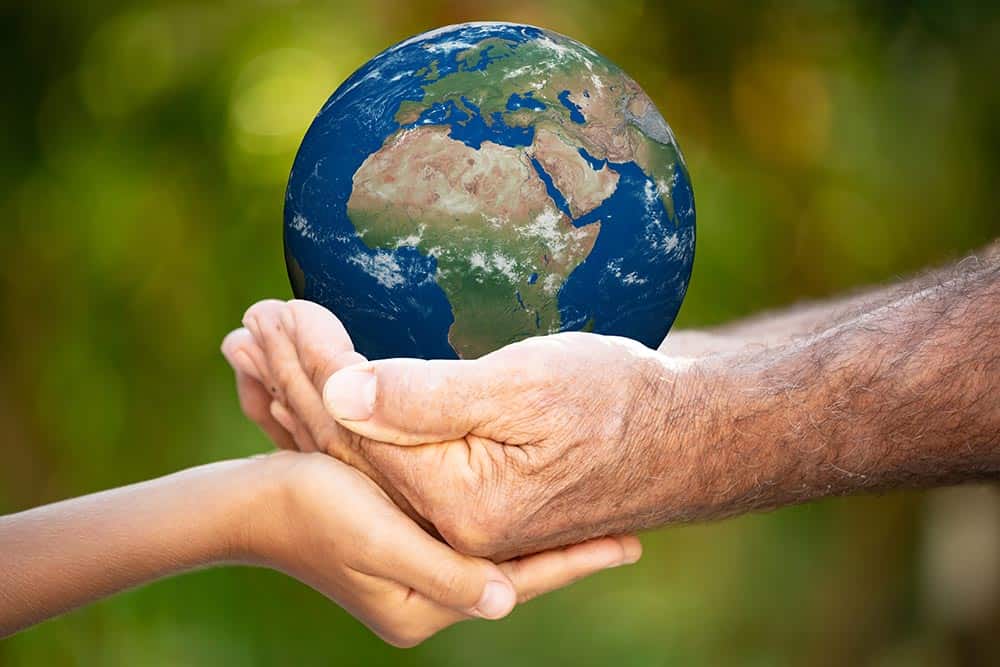
The Laudato Si’ Action Platform is a call to the universal Church and to all people of goodwill to respond joyfully to Laudato Si’, Pope Francis’ encyclical on the care of our common home.
Laudato Si’ reminds us that “everything is connected” (LS 91). The brokenness in our relationship with God has impacted our relationships with others and with creation itself. As a result, we are witnessing an increasingly unstable and fragile world. We face a crisis that is both social and environmental (LS 139).
Pope Francis invites us to awaken a “loving awareness” of our shared home (LS 220). He calls us to act on three foundational relationships of our lives: with God, with our neighbors, and with the Earth (LS 66).
Good Christians and Upright Citizens

Inspired by Don Bosco’s vision of human development, we believe in the transformative power of education to form youth who are not only academically prepared but also socially responsible. The care for creation is part of our educational mission as it reinforces the importance of forming upright citizens and good Christians.
Our participation will be a commitment to fostering ecological awareness, promoting sustainable lifestyles, and engaging academic communities as actors of change. We can echo Don Bosco’s dream of forming the youth to build a better world,
A world reflecting God’s love, respect for creation, and upholding dignity for all.

